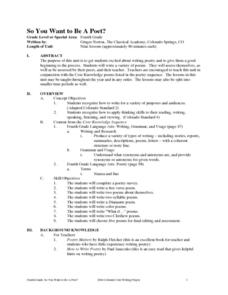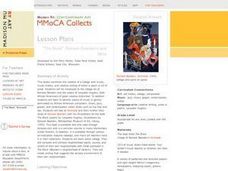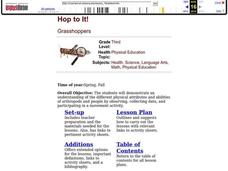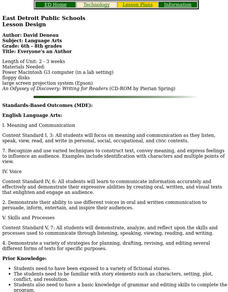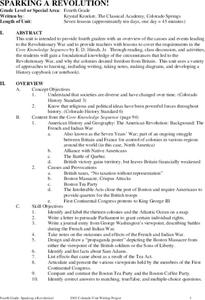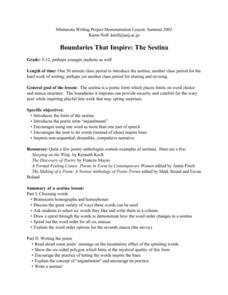Curated OER
Gardening for Beauty, Food, and Enjoyment
First graders create their own garden. In this plant lesson, 1st graders discover the essential elements for a plant to grow. They planted their own garden and read the amount of space needed and the sunlight preferred for each plant.
Curated OER
Migration
Students explore migration using the Internet and several pre-chosen websites. In this animal migration lesson students divide into groups and complete a lab activity.
Curated OER
Presenting Ecology through Rodent Control
Students discuss and explore an ecological problem regarding rodent populations. In this investigative instructional activity students work in teams, research a problem and present their findings to the class.
Curated OER
Save the Earth: It's Everyone's Home
Students explore how recycling helps save trees and protect the environment. In this environmental concern lesson, students color a handout of animals that live in forests. Students discuss how recycling paper can save trees and set up...
Curated OER
Zen Gardens
Students study the design elements and symbolism of Japanese gardens through a hands-on lesson in Zen Garden design.
Curated OER
What Is Kwanzaa?
Students use vocabulary related to Kwanzaa. They identify main ideas and details related to the celebration of Kwanzaa and summarize information about Kwanzaa. They make picture books appropriate for first and second graders.
Curated OER
Don't Worry, Be Happy
In this cheering up worksheet, students fill in the blanks to sentences about cheering up by answering multiple choice questions. Students complete 20 questions.
Curated OER
Rachel Carson
In this famous person worksheet, students read a passage about Rachel Carson and then complete a variety of in-class and homework activities to support comprehension, including partner interviews, spelling, cloze, synonym matches, and...
Curated OER
So You Want to Be A Poet?
Fourth graders study different types of poetry and then write examples in this unit. They write, among others, free verse, Diamante, Clerihew, and color poems.
Curated OER
"The Block": Romare Bearden's and Mine
Students study Bearden's style of collage and create their own collage that reflects their neighborhood. They are read "The Block" and poems about neighborhoods and write one about theirs.
Curated OER
Todd Hido
Students do many activities and study one of Todd Hido's photographs to investigate composition and a sense of place.
Curated OER
Writing Places
Students brainstorm ideas after being read a poem and then are to write their own poem and read them out loud.
Curated OER
Hop to It!
Third graders demonstrate an understanding of the different physical attributes and abilities of arthropods and people by observing, collecting data, and participating in a movement activity.
Curated OER
Everyone's an Author
Students examine variety of written pieces of quality fiction, discuss what different story elements are present and how those elements make stories as effective as they are, and create a class story.
Curated OER
Appreciating Our American Heritage
Learners learn about the Chinese culture via literature. They read the poetry of Cathy Song, considering national pride as Americans and Chinese.
Curated OER
Sparking a Revolution!
Students investigate the causes and events that lead to the US Revolutionary War. They use a number of study techniques in this unit to discuss why the colonies wanted freedom from Britain.
Curated OER
Boundaries That Inspire: The Sestina
Young scholars study the poetic term "enjambment". They use one word as more than one part of speech and let words (instead of ideas) inspire lines and non-sequential, dreamlike, compulsive narrative.
Curated OER
One Windy Wednesday
Students read and discuss the novel, "One Windy Wednesday." They complete a variety of activity cards and assignments associated with this novel. Each student draws windy day pictures, make a kite and record weather and kite observations.
Curated OER
Mythology
For this mythology and poetry worksheet, 10th graders write poems about characters from mythology. Students use the diamond form to write their character poems.
Curated OER
Jacob the Great
For this reading comprehension worksheet, students read a 1 page passage titled Jacob the Great and complete comprehension, inferential, and story element questions about it. Students complete 22 multiple choice questions.
Curated OER
Conditionals
In this conditionals worksheet, students fill in the blanks to sentences with the correct conditional form of the verbs given. Students complete 27 fill in the blank and 15 multiple choice questions.
Curated OER
Metaphors
In this metaphor worksheet, students make a "word card" with the word metaphor for their vocabulary bank, then determine whether statement from The Dragonslayer are similes or metaphors,
Curated OER
Collage for all Seasons
Students reinforce their knowledge of seasons and the types of weather and precipitation that occur during each season. They use previous learning of weather, precipitation, and seasons from a weather unit to create a collage for all...
Curated OER
North Carolina Place Names
Fourth graders examine a map of North Carolina to discover the heritage left behind in the names of various places. They compare/contrast those derived from Native American culture to those derived from European settlers.










